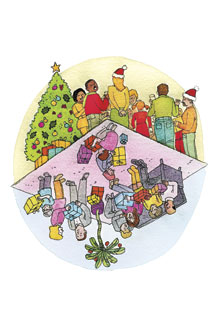O Come, All Ye Free Spirits

Illustration by Jorge Colombo
Feel as if none of the standard holidays suits you? Paul Rudnick discovers that there's something to be said for inventing your own.
I grew up in suburban New Jersey as a Jewish boy surrounded by Christians, and so I developed a severe case of Christmas envy. I had no interest in the religious aspects of the forbidden holiday, but I was mesmerized by homes where hundreds of Christmas cards were displayed by slipping them into louvered shutters; by doorknob covers handcrocheted with Santa's face; and especially by any miniature, old-timey village arranged beneath a Christmas tree, with a hand mirror pond landscaped with cotton ball snowdrifts and little molded plastic Victorian buildings, being visited by little molded plastic Victorian carolers. I loved Christmas glitz. Years later I wrote a play in which the main character's apartment is smothered in tinsel, neon reindeer, and human-size plastic snowmen. A friend of the character asks, "But aren't you Jewish?" and the guy replies, "Duh."
Only a Jew can truly appreciate the glory of, say, a prefab brushed-aluminum tree draped with pink twinkle lights and cobalt blue ornaments; Gentiles often take such splendor for granted. During the early years of my childhood, my family celebrated Hanukkah, with my parents diligently lighting the candles on our menorah and giving my brother and me gifts to celebrate each of the eight nights the ancient Maccabees did whatever it was they did. Much to their credit, my parents refused to have a Christmas tree and call it a Hanukkah bush. I've seen Jewish homes that try to out-decorate the Gentiles; one family owned a menorah in which each candle was held by a painted brass figurine of one of the seven dwarves, with Snow White for the final night. There's also a children's book that attempts to combine the Jewish and Christian holidays—it's called Blintzes for Blitzen.
I was a greedy and selfish child, and I was convinced that my nightly Hanukkah gifts were dinky compared to my Christian friends' hauls—I mean, just look at those mountains of deliciously wrapped packages under those trees. Who were my parents kidding? All I wanted was holiday justice.
My parents either got tired of my whining ("I'm only asking to be treated like every other kid on this block") or weren't all that into Hanukkah, either, and as I entered my teens we pretty much gave up on the candle lighting and the Hebrew prayers. My parents were still too Jewish to ever allow any sort of wreath or nog in the house, so together we arrived at what I consider to be an ideal solution: We made up our own holiday. We picked a day in December that was convenient for all of us, and we exchanged gifts. Rather than seeming like a compromise, this day felt special, because our family was the only one that celebrated it. It was like declaring a Judeo-Christian-Rudnick way of life.
On the actual days of Hanukkah or Christmas, we tended to watch TV, read, and snack, feeling strangely superior because we never had to panic over last-minute purchases or wiring problems or pine-scented candles setting the wrapping paper on fire. We could stroll leisurely through the malls packed with irritated, exhausted holiday shoppers swatting their equally crabby kids ("Jimmy, I swear, if you say one more word, you're not getting anything! Ever!"). An invented holiday is not for everyone, and I'm not sure if the pope or the Kabbalah people would approve, but I liked it. Even today, sometime in December I'll call my mother with our own version of "Happy Hanukkah" or "Joyeux Noël!" In our house, we just merrily ask, "How's Tuesday?"



